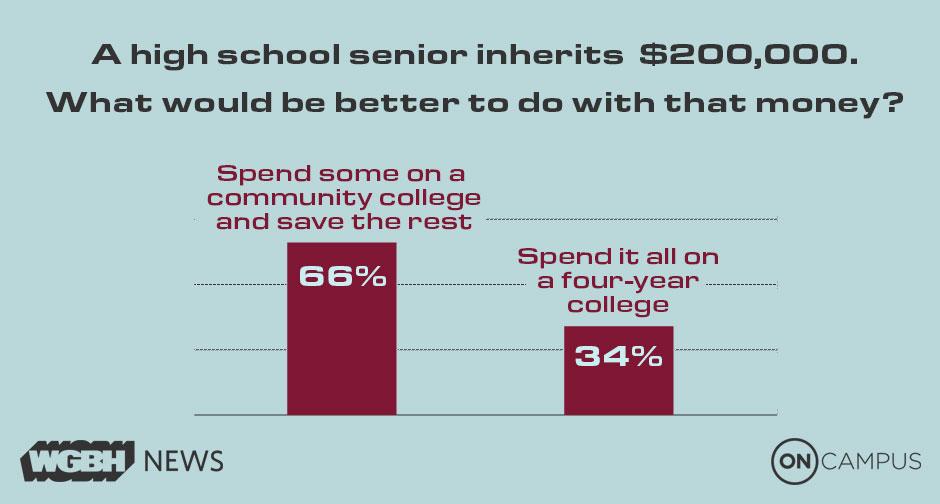Springfield Technical Community College's front entrance is being repaired/
Community colleges have long operated in the shadows of more expensive, elite four-year colleges, but worries about the cost of college are now drawing students to these two-year programs. A new survey by WGBH News shows Americans believe strongly that community colleges are essential to providing families with opportunities.
This fall, Michael Caine could have been walking the leafy campus of an elite four-year college. He got into his top choice, Hobart and William Smith in upstate New York, but he’s chosen to walk the drab halls of Springfield Technical Community College (STCC) instead.
“I never really thought that this would be the option for me,” Michael says. “I got the, ‘Oh you’re going to STCC’ kind of thing, but it’s definitely underrated.”
Underrated and less expensive.
The sticker price at Hobart and William Smith is $57,000 a year. For his tuition at STCC, Caine's family is paying $5,000 dollars annually.
“I have to give Michael a lot of credit for wanting to be part of the financial picture, because he hears about kids coming out with loans and just didn’t want anything to do with it,” says Caine's father, Brian Caine.
Caine's dad is a retirement advisor, and he urged his son to attend STCC. He admits going to community college and living at home was a pretty tough sell.
“We had to come down here to kick the tires,” Brian says. “He wasn’t thrilled about it, I'll tell you that. But it’s the best decision that we made.”
Across the country, middle-class families like the Caines are questioning the value of expensive, four-year degrees, and they’re finding an alternative — not online, but right in their backyards at community colleges.
WGBH News asked 1,100 adults across the country: If a high school senior inherited $200,000 dollars, would it be better for him or her to spend it on a four-year college, or spend some on a community college and save the rest. More than 60 percent advised going to community college and keeping the rest of the money.

Related: Would You Recommend Community College Over Four-Year College?
“I think a lot of us think of community colleges as a last resort, but that does not appear to be where Americans are on this,” says Chris Anderson, president of Anderson and Robbins Research.
Anderson's firm conducted the poll, and he says the findings show when it comes to college, Americans are putting a premium on value.
“About 50 percent gave a negative value rating to private four-year colleges,” Anderson says. “So I think this really is bubbling into the mainstream. The value proposition with four-year colleges may be a little bit out of whack right now.”
Caine says the value of taking classes at STCC is about more than money.
He wants to be an architect, and feels that his classes here at STCC are giving him practical training he wouldn’t necessarily get at a private college.
“You may go to these four-year colleges that are prestigious, but you maybe don’t learn the day-to-day aspects,” Caine says. “You learn the history, how to draw pretty buildings. But you don't learn how they work; how they function."
Caine recognizes that some may think he made the wrong decision, because he's missing the on-campus experience, and his education may not look as good on paper to potential employers.
"College credentials have historically been a way to signal to employers not necessarily what people have learned, but where they learned it," says political scientist Richard Kazis.
He says as the economy continues to recover, there are millions of decent-paying jobs in the trades that require two-year associate's degrees, so not everyone necessarily needs a four-year degree.
“We are a country where the four-year college and university is seen as the starting point for making it into the middle class,” Kazis says. “It's not really true anymore."
And that's, in part, why Caine is sticking with his plan.
"I'm learning tons of information,” Caine says. “All real hands-on information. And I'm saving money."
And the money he saves these first two years at STCC could give him the option of transferring to a four-year school, without the heavy burden of student loans.
This story was produced by On Campus, a public radio reporting initiative focused on higher education produced in Boston at WGBH. This story is part of a series on community colleges, "College Material." You can find the entire series here.